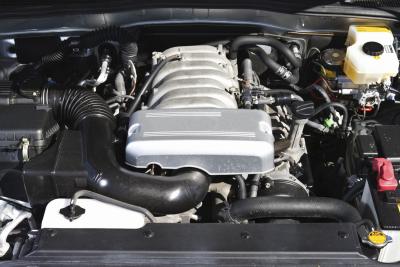
The oil system is a crucial component of any engine, including the Chevrolet 305 CI engine. A lack of (indicated) oil pressure can be caused by several things---from a simple faulty oil pressure sending unit to failed main or rod bearings.
Do not operate the engine without verifying the cause for the warning: it may be a simple problem or it may be something severe. Engines with high mileage are prone to reduced oil pressure from normal wear of internal components. However, if the engine has begun making unusual noises (clattering, ticking or knocking sounds), it is a situation that needs immediate attention.
First, check for the correct oil level. If the engine appears to be operating normally without unusual noises, the instrumentation may be faulty. A sending unit (a "sensor" near the oil filter) sends an electrical signal to the gauge or warning light. With the key on/engine off, disconnect the wire to the sending unit (located near the oil filter) and observe the gauge---it should stay at zero. If good, the gauge can be isolated. Next, test the gauge (again, key on/engine off) by grounding the wire end to any metal part of the car. If good, it should read zero pressure when grounded.
If the sensor/gauge is working properly, a mechanical gauge should be installed in place of the electrical sensor to accurately determine the exact oil pressure. If readings are low, the problem may be a plugged or restricted oil filter---replace the filter and verify. If the low pressure accompanies abnormal engine noises, the likely cause is lack of oil, increased bearing clearances, faulty oil pump, damaged bearings or a restriction of oil flow back to the sump/oil pan.